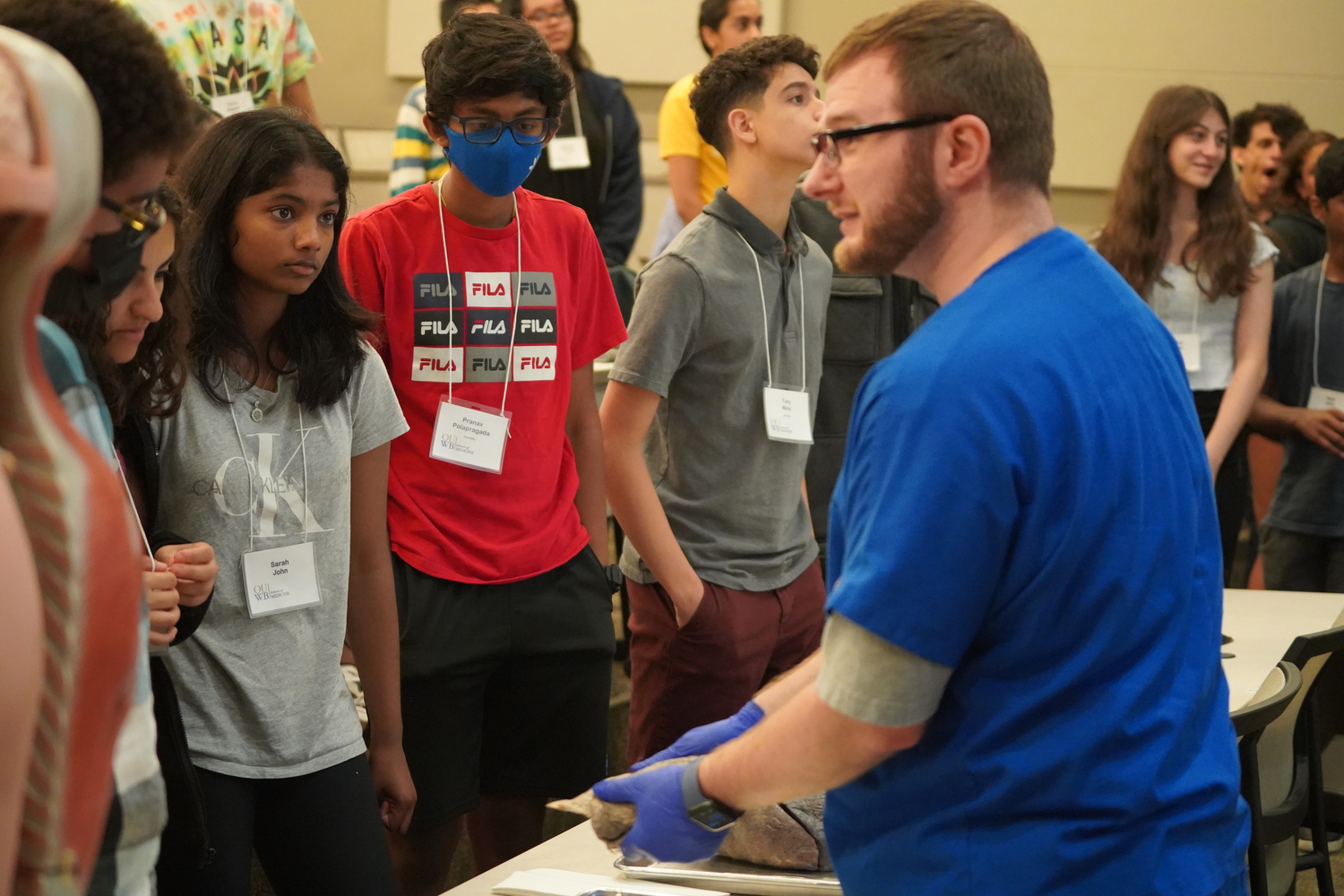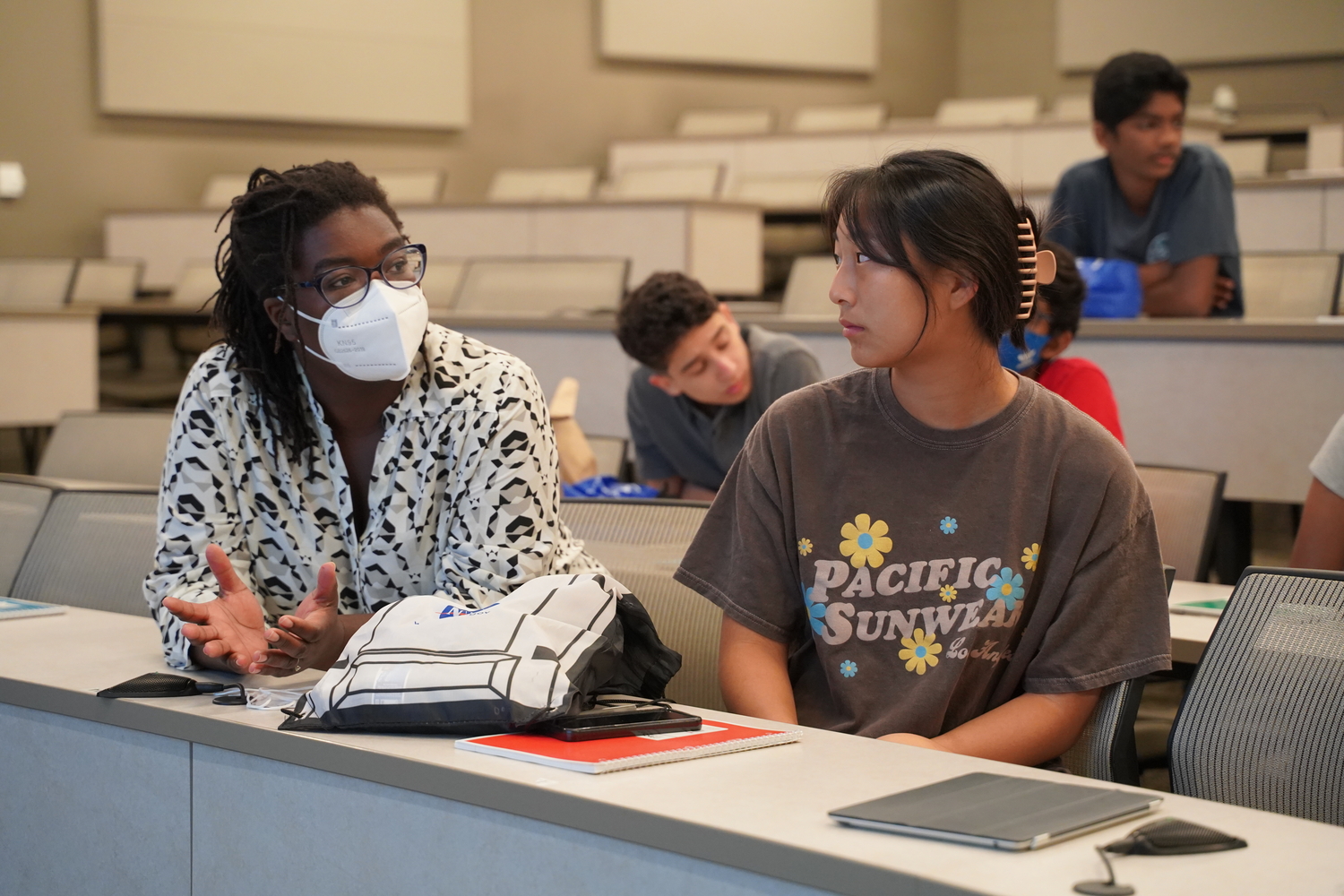
Area high school students explored the intersection of health behaviors, environmental exposures, social circumstances, and how they influence an individual’s health via OUWB’s 2022 Online Summer Enrichment Program.
Held July 11-15, the program — open to all high school students who have expressed interest in medicine and careers in health sciences — was a hybrid of online and in-person learning.
Led by OUWB Diversity & Inclusion, the program is taught by faculty members from OUWB’s Department of Foundational Medical Studies. The theme of this year’s program was “The Environment, Health, and You.”
“This program is important not only because it provides high school students an outlet to explore health sciences, but because it gives students direct access to faculty and researchers, current medical students, and other professionals in the field of health care,” said Angie Freeman, coordinator, Diversity & Inclusion.
Kyeorda Kemp, Ph.D., assistant professor, Department of Foundational Medical Studies, coordinated the program curriculum aimed at helping students who “not only get to learn more about what it’s like to be a doctor but all the things that influence health.”
“It really opens their eyes and also allows them to make those connections and networks to other individuals that can help them succeed in the future,” said Kemp.
‘Students responded well’
Four of the five days were virtual and used a hybrid of synchronous and asynchronous learning. Each day, students logged on to engage with faculty about the day’s lessons.
The first day, for example, had modules covering an overview of the human body; basic cell, genetics, and microbes; biochemistry; and nutrition.
The second day had modules that covered environmental health; lead and the water crisis; and water quality and human health.
Lessons on days three and four were similarly themed.
“I think that the students responded well [to online classes], they liked the flexibility of it,” Akshata Naik, Ph.D., assistant professor, Department of Foundational Medical Studies said. “There was increased participation because of the online aspect.”
Early exposure is key
 |
| Kyeorda Kemp, Ph.D., assistant professor, OUWB, works with a high schooler during the medical school's Online Summer Enrichment Program. |
The last day of the program was held on the campus of Oakland University.
In the morning, students toured O’Dowd Hall, the Oakland Center, Kresge Library, and the Anatomy Lab in Hannah Hall.
Also in the morning, students were able to see up close a healthy lung and a smoker’s lung, and compare the differences. The lungs were from OUWB’s anatomy lab.
OUWB medical student Min Kim volunteered to help with the program all week, and co-led the tour on the last day. Kim, who minored in education as an undergrad, said she “loves working with students” and was impressed by their level of engagement.
“Hopefully, going forward, thinking about environmental health is more in their minds and not something new,” she said. “It’s nice that they’re getting early exposure to these topics and having to think about them.”
During the second half of the day, the students presented different topics regarding the environment and health in groups that they had been working in during the week. Some of the topics included food access, deforestation and the effects of lead exposure on children.
| More from OUWB |
Summer camp goers get visit from OUWB medical students Almost 50 OUWB summer internships in full force ‘Life-changing’: OUWB students return from study trip to Auschwitz |
The students were able to gain experience presenting in a college setting and even had a chance to answer questions from faculty members like Kemp and Naik.
After presentations, the students were greeted by a career panel of six participants: Associate Dean for Clinical Education Pierre Morris, M.D.; Assistant Dean for Admissions and Financial Services Dan Kallenberger; OU Admissions Adviser Jessie Gutierrez-Arredondo; Senior Recruitment Adviser Mikayla Gipson; Director of Population Health Informatics Ramin Homayouni, Ph.D.; and Program Manager at Detroit Food Policy Council Kibibi Blount-Dorn.
Panel members discussed their journeys to where they are today, providing helpful information to the students who will soon be starting their college careers.
“Sometimes life isn't planned, you just go with the flow and you take this unusual path to get where you want to be," said Morris. "I never intended to be a high school teacher, but that's what I ended up doing for 12 years."
“It's never too late to make a new beginning but you want to do it earlier. I wish I had done this a lot sooner," he added.
"But the other thing is you have to follow your heart and your dreams and go where you really want to be in life."
Homayouni provided insight about not only doing well in classes but also exploring different opportunities on the journey to medical school.
“You probably want to think about why you want to be a doctor. It's a combination of really having passion to help humans and the scientific part of it and you have to have this curiosity and work ethic,” said Homayouni.
“As you're going through college and exploring, you should get involved in the community, get involved in the scientific aspect, work in a lab to help you tease out what part of that you really have a passion for.”
Student reflection
Freeman, who hopes that the students had several takeaways from the experience, said the program was made possible because of volunteers like Kemp, Naik, Kim, and many other OUWB faculty and staff.
“(We hope that students gained) an understanding of human health and how it is impacted by the environment, an exploration of careers in health sciences by way of networking and connecting with faculty and current medical students and lastly, a sense of belonging and self-confidence within the field of health sciences,” said Freeman.
Feedback after the program indicates the program met those goals.
Students Tarun Rajesh and Adam Nigl reflected on what they had learned throughout the week.
“There’s new things I learned like how the environment can affect our health, because I really didn’t think about the environment that much,” said Rajesh. “The types of health as well like community health and how that can be affected by the environment.”
“I didn’t realize how adverse the environment was, I just thought it was just nature and outside but I didn’t realize there were a bunch of components and how related it was to our health overall,” added Nigl.
To request an interview, visit the OUWB Communications & Marketing webpage.
NOTICE: Except where otherwise noted, all articles are published under a Creative Commons Attribution 3.0 license. You are free to copy, distribute, adapt, transmit, or make commercial use of this work as long as you attribute Oakland University William Beaumont School of Medicine as the original creator and include a link to this article.

